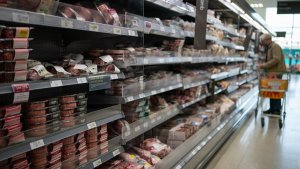Despite these encouraging retail figures, the UK economy faces growing concerns over consumer sentiment.
UK Retail Sales Surge In August, Defying Economic Gloom
Despite these encouraging retail figures, the UK economy faces growing concerns over consumer sentiment.

UK shop sales surpassed expectations in August, rising to their highest level since July 2022, according to new figures from the Office for National Statistics (ONS).
Sales volumes rose by 1% compared to July, far exceeding analysts’ forecasts of a modest 0.4% increase. This robust performance builds on July’s 0.5% rebound, marking a continued recovery after earlier declines in the year.
Core retail sales, which exclude motor fuel, delivered an even stronger result, increasing by 1.1%. This beat both the previous month’s 0.7% growth and market predictions of a 0.5% rise, reflecting a solid foundation in consumer spending.
On an annual basis, sales volumes in August surged by 2.5%, the biggest year-on-year jump since February 2022 and just 0.4% below the levels seen before the pandemic in February 2020. Core retail sales similarly saw a significant year-on-year increase of 2.3%, following a 1.4% rise in July.
The retail sector saw broad gains across the board, with supermarkets enjoying a notable 1.8% increase in food sales as more consumers hit the aisles. Clothing sales also saw a lift, bolstered by back-to-school promotions.
Retail Sales Defy Consumer Confidence Slump
Despite encouraging retail figures, the UK economy faces growing concerns over consumer sentiment. September saw a steep drop in consumer confidence, as measured by GfK’s consumer confidence index, which plunged to -20 from -13 in August—its lowest level since March.
The dip in sentiment highlights the economic uncertainty facing many households. Fewer consumers expressed optimism about their personal financial situations, and a growing number reported being hesitant to make major purchases. This lack of confidence comes amid rising unemployment, stubborn inflation—particularly in services—and concerns over the wider economic outlook.
The Bank of England’s more cautious stance, coupled with expectations of continued high interest rates, has further weighed on consumer sentiment. The central bank has taken a more measured approach compared to its global counterparts, focusing on controlling inflation while navigating a fragile economic landscape.
Tough Budget Could Further Unsettle Consumers
Looking ahead, the upcoming Budget on October 30 looms large over both consumers and the broader economy. There is widespread speculation about how the Chancellor, Rachel Reeves, will approach the situation, especially given a recent £10 billion windfall from the Bank of England.
However, early indications suggest that Reeves remains focused on debt reduction rather than offering immediate relief to consumers. Reports indicate that she plans to scrap the winter fuel allowance, prioritizing long-term fiscal health over short-term spending boosts.
Despite the strong retail sales in August, the broader picture for the UK economy remains mixed. The sharp decline in consumer confidence suggests that many households are bracing for tough times ahead, even as retailers enjoy a temporary boost.
Thanks for signing up to Minutehack alerts.
Brilliant editorials heading your way soon.
Okay, Thanks!


